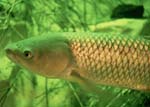|
Grass Carp for
Aquatic Weed Control
Herbivorous fish, the grass
carp, sometimes call the white amur (Ctenopharyngodon idella) is the most
effective biological method to control aquatic vegetation.
 The white amur originated
from the Amur river in China from which it received its name. Grass carp
are related to the common carp, but they look very different. They are a
much more slender fish and have a silvery color. Their mouth is located at
the front of the head, rather than down turned or sucker-like as in the common
carp. The white amur originated
from the Amur river in China from which it received its name. Grass carp
are related to the common carp, but they look very different. They are a
much more slender fish and have a silvery color. Their mouth is located at
the front of the head, rather than down turned or sucker-like as in the common
carp.
Grass carp will not reproduce
in ponds and lakes since they need large, fast-flowing rivers for reproduction.
The young grass carp will feed on small crustaceans and insect, but as they grow
larger shift their diet to plant material. They prefer some plants over
others, but will consume most species of floating and submersed plants.
They will pull out and feed on some of the immersed plants, but will not be able
to control them.
Grass carp have voracious
appetites and grow rapidly. They will eat 10 times their body weight a day
and will gain 5 to 10 pounds in one year. Researchers say that grass carp
can reach weights of more than 70 pounds in this country. Once the
vegetation is controlled, their growth rates will level off also. Contrary
to belief, they can be caught on hook and line, and are exceptionally fine
eating.
Suggested stocking rates for
grass carp are from 10 to 20 per acre. Stock 10 per acre for general
maintenance, 15-20 per acre for 1/2 to completely covered ponds. Control
is achieved within one year at these stocking levels. At half these
levels, control may take up to two years. The initial stocking should be
effective for several years since these are long-lived fish. A few
replacement fish can be stocked if aquatic infestation increases.
Grass carp are highly mobile
and they will rapidly leave a pond or lake during periods of heavy flow over the
spillway. Use of a mesh fence across the spillway can prevent loss of
these fish.
Some states
have restrictions regarding the use of grass carp. Triploid carp are
available for clients in states where such restrictions apply.
|